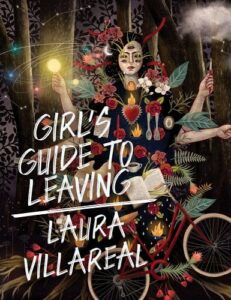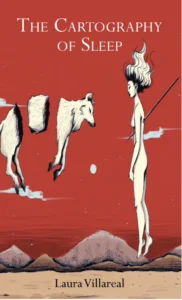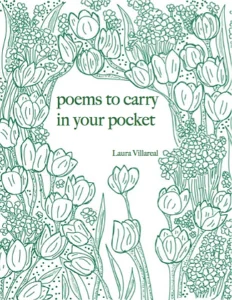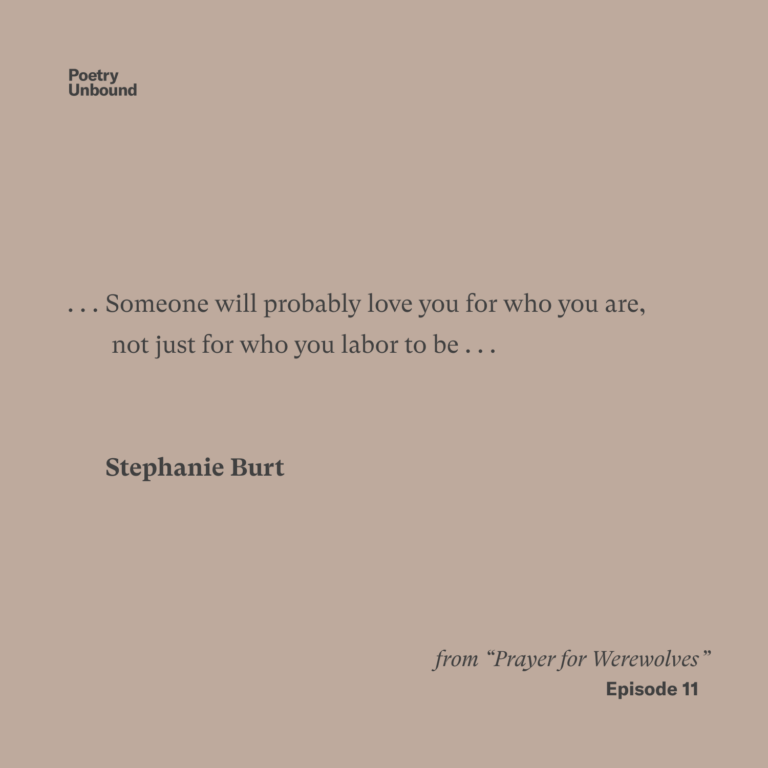Laura Villareal
My Worries Have Worries
If you were to use a metaphor for your worries, what metaphor would you turn to? Here, the worries have worry babies of their own. And they look back at the poet. What do they see?
We’re pleased to offer Laura Villareal’s poem, and invite you to connect with Poetry Unbound throughout this season.
Pre-order the forthcoming book Poetry Unbound: 50 Poems to Open Your World and join us in our new conversational space on Substack.
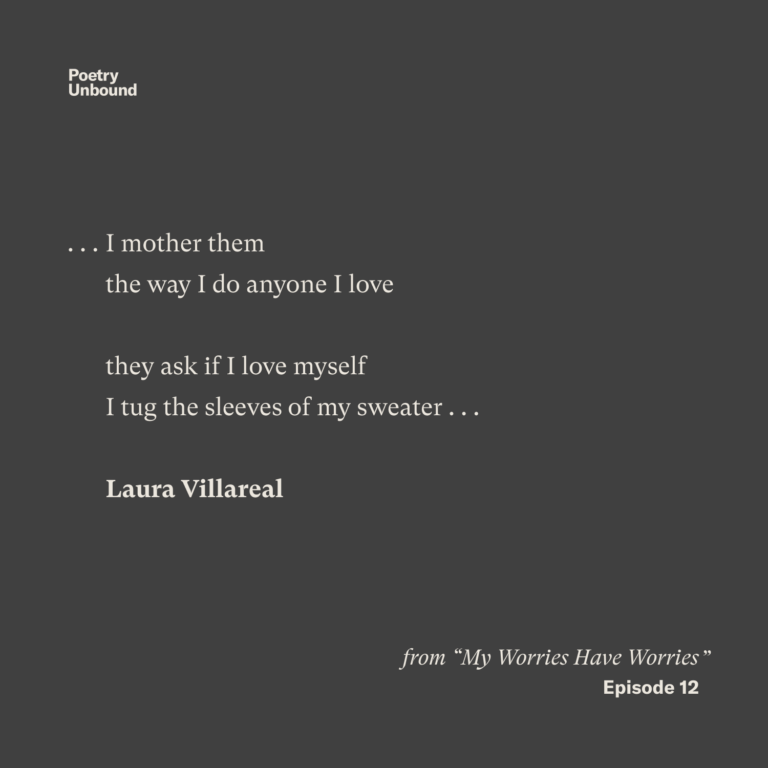
Guest
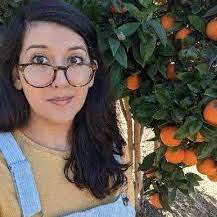
Laura Villareal is the author of Girl’s Guide to Leaving (University of Wisconsin Press 2022), The Cartography of Sleep (Nostrovia! Press 2018), and Poems to Carry in Your Pocket (L'Éphémère Review 2018). Villareal interviews writers for the series “Writers Talking about Anything But Writing” at F(r)iction.
Transcript
Pádraig Ó Tuama: My name is Pádraig Ó Tuama and all throughout my twenties, my health wasn’t great. I had one of those elongated fatigue conditions. And it was fatiguing of course, but it was also fatiguing to be fatigued. And the pressure sometimes that people put on me to say, you need to really want to get better. Sometimes I was too tired to want to get better. I just needed to get through the day. And for me, one of the things I needed to learn was these twin realities of recognizing that I had to change my expectations, and also that I could find ways that art could help me. Writing poetry, reading poetry, having a conversation that felt creative, even though my life didn’t feel very creative.
[music: “Praise the Rain” by Gautam Srikishan]
“MY WORRIES HAVE WORRIES” by Laura Villareal
“MY WORRIES HAVE WORRIES
“so I built little matchstick houses
with large ceilings, a garden for them to grow
“tomatoes, cilantro, & carrots
their worry babies will eat
“but they chew on the henbit of me anyway
both my past & future entwined into disasters
“I tell them I worry about their health
that they’re not eating properly
“I mother them
the way I do anyone I love
“they ask if I love myself
I tug the sleeves of my sweater
“begin thatching a leaking roof
water their garden
at night
“I can hear them
dancing around a bonfire
“all I’ve built burned
down, a soot snowfall
“tomorrow they’ll wait for me
& I’ll reconstruct their home
anyone would do the same”
[music: “What Did You Not Hear” by Gautam Srikishan]
I love the brilliant imagination behind this poem. To let your worries have characters and to turn them into worry babies, with worry houses, and worry activities, and worry bonfires, and little worry malevolences back as well as little worry wisdoms. Laura Villareal here, has made an internal conversation happen through characters. All of these are voices in herself, of course.
There’s a theory in conflict resolution called distanciation where, when you’re in the middle of a conflict, you’re supposed to step away from it. You can ask somebody to talk about their conflict in the third person, to describe it in the future tense. You can ask them to use a language technique that can help them feel just a tiny bit removed in order to be able to see, have a little bit of distance to the thing that is so consuming them. So many psychologists would recommend the same thing. And art has known this for a very long time: that somehow the closer you are to something the less you can see it. What Laura Villareal has done so brilliantly here is to let the worries be characters in and of themself, that they have their own independence.
When she recognizes that she mothers them the way she does anyone she loves, then the worries come in with that extraordinary question of insight: “do you love yourself?” And she tugs the sleeves of her sweater. This is a person who’s built houses, put gardens together, is industrious in the relationship with worries, and here is just tugging the sleeves of the sweater left without anything to do, because this question is such an important and interesting question. And then she finds something to do. Thatch the leaking roof and water the garden, when it’s clear the whole way through already that they’re not interested in a garden. They’re interested in setting things on fire and she too is being called around that fire.
I think Laura Villareal has done something absolutely brilliant in this poem by using this drama therapy almost to show and exhibit to us the ways within which there’s a cyclical experience of the conversation between herself and worries: “If I’m able to resolve my worries, if I am somehow able to move beyond having this kind of relationship with my worries, will they be upset? Will they feel like I’ve been faithless?” I feel such tremendous respect for Laura Villareal where she has crafted this voice that so many of us can connect with where we have, perhaps, an overabundance of relationship to the worrying part of ourselves and wouldn’t know who we’d be or what we’d do were that worrying part of ourselves to somehow become less worried.
[music: “Dirty Wallpaper” by Blue Dot Sessions]
One of the things that the poem knows is that whether or not a particular time of worry or anxiety or pressure is just for a few months, or goes on for a number of years, it doesn’t matter, because each of those can feel just as intense. “[T]omorrow they’ll wait for me / & I’ll reconstruct their home / anyone would do the same”. The speaking voice of this poem can’t imagine a future where there would be a different relationship to the worry, even though the worries are not paying attention to the things that she’s doing to look after them. They’re gnawing at the bit of her and burning down everything she’s offering them.
“[T]hey eat the henbit of me.” Henbit is a plant, you know, useful for holding soil together during winter storms. And so, the worries eat her capacity to hold things together. She’s caught in a cycle, but she can’t imagine her way out of the cycle. There’s such empathy and such connection for any time in any of our lives where we felt in the moment of thinking, “I feel like if I were to break out of this, I wouldn’t know who I am.” And therefore people saying, “break out of it, get better, try this, try that.” All of that can seem totally overwhelming. She has painted for us the dilemma at the heart of the dilemma, which is that it can be hard to hold on to the possibility that things might change.
[music: “Creatures of Myth” by Gautam Srikishan]
There’s a lot of imagery about fire the whole way throughout this poem. It begins with a house that’s built with match sticks. That’s just asking to be burned down, in a way. And then the house gets set alight and the worries dance around the bonfire of it while soot falls like snowfall.
So who sets the house alight? Could the house be built with something else? Do these worries need a house? Do they need something else? And if the worries don’t want to be in a house, where do they want to be? Do they want to dance? What about if she built a fire for them so that they could dance around it together?
Such interesting imagery comes from imagining the worries as these distinct characters with their distinct lives. On the one hand, these little worries are wild, they’re uncontainable. I find them fiercely independent. They’re doing what they want. And yet, in doing what they want they have some information embedded within them, which is about dance, which is about fire, which is saying, “we don’t want to be contained, we want to be set loose, like fire, like burning things down.” And what is that next level of the conversation between the worrying speaker of the poem and the worries as they’re dancing around this conflagration?
[music: “Thread Caramb” by Blue Dot Sessions]
I always am moved by the line in the middle of this poem. “I mother them / the way I do anyone I love.” I find it devastating. And it’s clear that the speaker of the poem is showing a certain kind of love to her worries, and the poem knows too, that they don’t love her back. Not in the way that she imagines they will, anyway. Perhaps she was imagining them to say, “thanks very much for the house. Thanks very much for the cilantro. Perfect. That’s great. We’ll stay here.” But they don’t. They go wild. And where can the speaker of the poem be in a different mode? Is it that the rage of the worries dancing around the bonfire is in fact, her own rage or anger or creativity or surprise or change or just the desire to dance? The drama of this poem is that it’s written from a place of predictability. But the insight of the poem is recognizing this and therefore the poem is an invitation into something else that can be done to disrupt this cycle so that something new, something magnificent, and surprising can happen in the conversation and dynamic between the speaker of the poem and the worries.
[music: “Creatures of Myth” by Gautam Srikishan]
“MY WORRIES HAVE WORRIES” by Laura Villareal
“MY WORRIES HAVE WORRIES
“so I built little matchstick houses
with large ceilings, a garden for them to grow
“tomatoes, cilantro, & carrots
their worry babies will eat
“but they chew on the henbit of me anyway
both my past & future entwined into disasters
“I tell them I worry about their health
that they’re not eating properly
“I mother them
the way I do anyone I love
“they ask if I love myself
I tug the sleeves of my sweater
“begin thatching a leaking roof
water their garden
at night
“I can hear them
dancing around a bonfire
“all I’ve built burned
down, a soot snowfall
“tomorrow they’ll wait for me
& I’ll reconstruct their home
anyone would do the same”
[music: “Praise the Rain” by Gautam Srikishan]
Chris Heagle: “My worries have worries” comes from Laura Villareal’s book Girl’s Guide to Leaving. Thank you to University of Wisconsin Press, who gave us permission to use Laura’s poem. Read it on our website at onbeing.org.
[music: “Praise the Rain” by Gautam Srikishan]
Poetry Unbound is: Gautam Srikishan, Eddie Gonzalez, Lilian Vo, Lucas Johnson, Amy Chatelaine, Kayla Edwards, and me, Chris Heagle.
Our music is composed and provided by Gautam Srikishan and Blue Dot Sessions.
This podcast is produced by On Being Studios, which is located on Dakota land. Open your world to poetry with us by subscribing to our Substack newsletter at poetryunbound.org. You may also enjoy our other podcast On Being with Krista Tippett, or our newsletter, The Pause. Visit us at onbeing.org to find out more.
Pádraig Ó Tuama: Friends, thanks very much for listening to Poetry Unbound, whether you’re new or you’ve listened to them all — your attention makes everything worthwhile. And I’ve got some news: I’ve written a book, Poetry Unbound: 50 Poems to Open Your World. There’s 50 poems, each with a fresh essay written by me. I’d love if you’d pre-order it, or pre-order a few, and join up to our free interactive newsletter. Links to everything at poetryunbound.org.
Books & Music
Recommended Reading
The On Being Project is an affiliate partner of Bookshop.org and Amazon.com. Any earnings we receive through these affiliate partnerships go into directly supporting The On Being Project.






